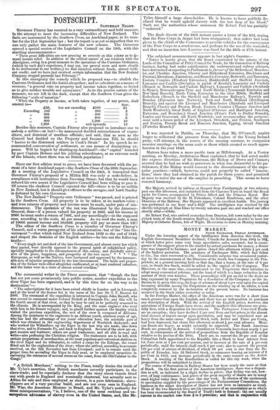POSTSCRIPT
SATURDAY NIGHT.
Governor Fitzroy has resorted to a very extraordinary and bold measure, in the attempt to meet the increasing difficulties of New Zealand. The facts are itnnouneed by the Southern Cross, an Auckland paper, in its num- ber for the 21st September last ; but the report is as yet so imperfect that we can only gather the main features of the new scheme. The Governor opened a special session of the Legislative Council on the 19th1 with this startling announcement- " Three great difficulties are now pressing so severely on this colony as to de- mand instant relief. In addition to the cntical nature of our relations with the Aborigines' owing in a great measure to the operations of the Customs Ordinance, (which by each day's experience, I may say, are proved more and more clearly to be detrimental to our welfare,) we find ourselves without funds, almost with- out credit; and we have just received certain information that the New Zealand Company stopped payment last February! "
In this emergency the remedy which he proposed was—to abolish the Customs Ordinance and the duties altogether; and to substitute as a means of revenue, "a general rate on property and income taken together, so levied as to give neither trouble nor annoyance." As to the precise nature of the measure, we are left in the dark, except that the Southern Cross gives the following" scale of taxation."
" When the Property or Income, or both taken together, of any person, shall
amount to-- Rate.
£30, but not exceeding £100
Exceeding 100 1/ 200 2
„ 200 77 400
9/ 400 e 800 6 800 1,200 10
1,200 and upwards 12 Besides this measure Captain Fitzroy also proposed to introduce one to .ernbody a militia—at last!—he announced decided retrenchment of expen- ditnre' and dismissal of needless officials; and said, that as soon as the Council had decided on the Property and Income-tax Bill, he should ▪ beaten to the distressed. settlers in Cook's Strait." In his speech he re-
oommended concentration of settlements, as one means of diminishing ex- pense. Will he begin it by shutting up Auckland ?—the" capital" founded by poor Captain Hobson and his jobbing subordinates, at an extreme nook of the Islands, where there was no British population !
Since our first edition went to press, we have been favoured with the pe- rusal of a later Auckland paper—the Southern Cross of the 28th September. At a meeting of the Legislative Council on the 24th, it transpired that Governor Fitzroy's proposal of a Militia Bill was only a make-believe, in -compliance with instructions from Downing Street; but that he would have refined his own assent if the Legislative Council had been willing to pass it. Of course the obedient Council rejected the bill—there is to be no militia in New Zealand, lest it should give offence to the savages; and Lord Stanley is defeated by his own Governor.
, The New Zealand "Property-rate Ordinance" was passed, and is printed in,the Southern , Cross. All property is to be taken at its market-value ; and true returns of property and income must be made under pain of mis- demeanour.: The operation of the tax was illustrated by the Attorney- General, thus—if a person valued his property at 5001. and his income at 2001. he must make a return of 7001., and pay accordingly—in the supposed case, according to the scale, 61. per annum. As we read the scale, a Man of 10001. annual income and 10,0001. property will pay no more than 121! The editor of the Southern Cross is a member of Governor Fitzroy's Council, and a warm panegyrist of his administration: but of the "late Go- vernment "—that which ruled New Zealand from 1839 to the end of 1843, and shaped, the destinies of the English settlers—he lets ouf the following
truths— . "Every single act and deed of the late Government, and almost every law which they passed were directly opposed to the general spirit of enlightened policy, specially inapplicable to the circumstances of this colony, and decidedly subver-
sive of the peace, happiness, and prosperity of the two races." • • "The Europeans, as well as the Natives, were harrassed and oppressed by the innumer- able acts of injustice perpetrated by the late Government. The lands and proper- ties of the former were either altogether confiscated, or at least rendered valueless; and the latter were in a state of almost actual rebellion."


























 Previous page
Previous page